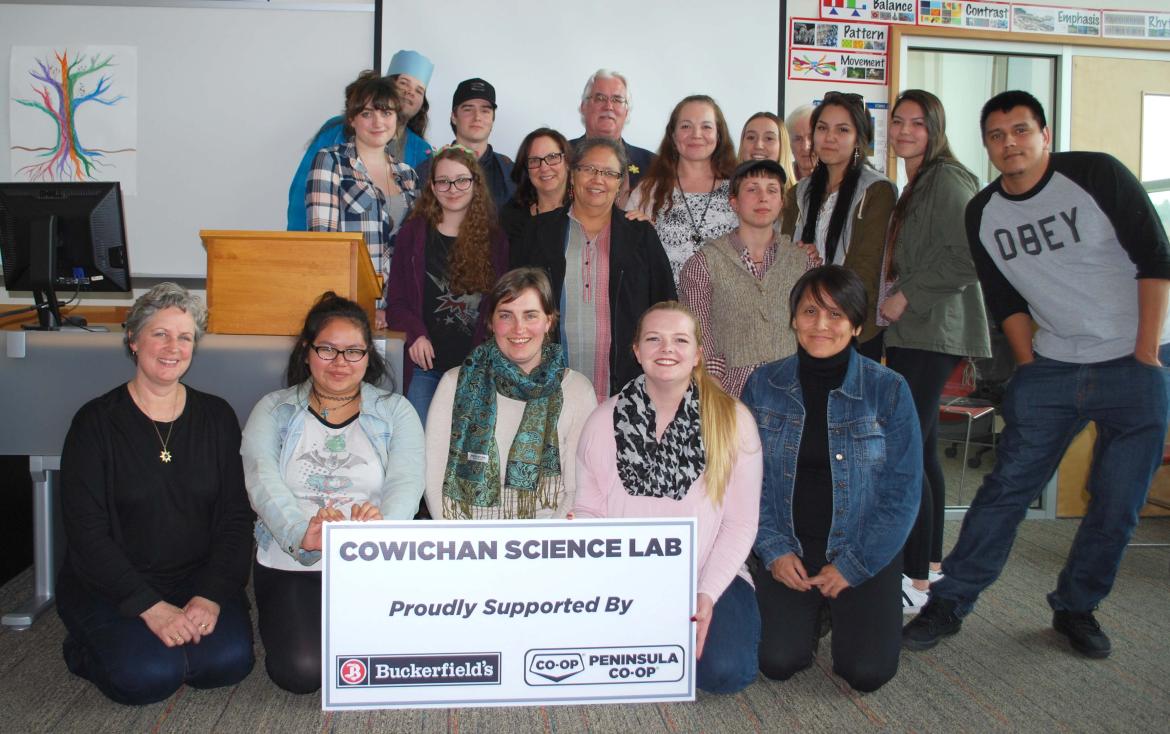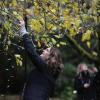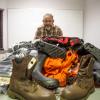
Students and their instructors, Dr. Suzie Nilson and Stella Johnny (centre), in INTR 211 paused during their year-end celebration to thank the donors who helped make the course possible by donating the money needed to outfit the science lab at VIU Cowichan, including Buckerfield’s and Peninsula Co-Op. The new course, the first of its kind for VIU, explores the science of plants and the environment from both Indigenous and Western viewpoints.
April 27, 2017 - 9:45am
The first of its kind at VIU, INTR 211 is taught by a Biology Professor and a Traditional Knowledge Keeper, who each present different perspectives on the science of plants and the environment
Tina Turan, a third-year Bachelor of Education student at Vancouver Island University’s (VIU’s) Cowichan Campus, says a new course that explores the science of plants and the environment from both Indigenous and Western viewpoints has deepened her respect for nature and helped her develop a greater understanding of the world around her.
Turan, from Esquimalt First Nation, says she has learned a lot about the native plants in the region and both the healing and nutritional properties of plants she walks by every day – knowledge she plans to pass on to her students once she becomes an elementary school teacher.
“They’re not just weeds – so many have nutritional properties and healing properties,” she says. “I also enjoyed learning different First Nations protocols, and hearing the wisdom of the Elders. It’s good to have that knowledge because the First Nations component is so important to bring into classrooms – teachers are going to need to know this going forward.”
The course – Interdisciplinary Studies 211: Indigenous and Western Sciences of Plants and the Environment – focuses on plants and their relationship to human health and the environment. It was made possible thanks to funding from Peninsula Co-op and Buckerfield’s. Both businesses contributed $10,000 to the campaign to outfit the science lab with equipment, and there were also two anonymous gifts of $12,500 and $5,000. These gifts have also made other science courses a possibility at the campus.
“We are honoured to have been able to provide funding for such an amazing science course that is the first of its kind at VIU,” says Penny Sopel, Peninsula Co-op marketing and community relations manager. “The learning experience is fantastic and the knowledge these students gained about plants extremely educational.”
The course was taught by Dr. Suzie Nilson, a VIU Biology Professor, and Stella Johnny, a Traditional Knowledge Keeper from Cowichan Tribes. Throughout the semester, Johnny shared teachings and stories from different First Nations and took students out to gather plants, showing them different harvesting protocols and explaining what each plant is used for in different First Nation communities and why.
In the lab, students learned how to use microscopes, and tested plant medicines on bacterial populations. Nilson discussed aspects of plant biology and applications to health. She appreciated watching the students point out common ground between her and Johnny’s presentations.
“There was a lot of critical thinking happening throughout the course,” she says. “The students talked to each other and came up with it on their own. They also got to see us taking turns being students ourselves and learning from each other.”
Johnny enjoyed watching students test the effectiveness of plants such as rosehips, which First Nations communities have traditionally used for a variety of ailments such as colds, against bacteria using Western scientific methods.
“We bring two different perspectives to the students, but there is so much common ground,” she says. “The learning from each other has been so important. We have truly walked hand-in-hand throughout this course.”
For Margaret Seymour, a VIU Cowichan Bachelor of Education student, learning science has always been a struggle because she finds it hard to engage with different scientific concepts, so when this course became available, she jumped at the opportunity to join. From the Stz’uminus First Nation near Ladysmith, Seymour grew up hearing the Indigenous science perspective, so she felt she was going into the course on solid ground.
“Putting the Indigenous and Western perspectives together in the course helped me understand the Western science perspective a lot better,” she says. “Growing up, I never realized I was learning science. I’m engaging more with the curriculum because it includes that Indigenous viewpoint.”
INTR 211 will be offered again next spring at VIU’s Cowichan Campus. In Spring 2019, Nilson and Johnny plan to teach another new course, Indigenous & Western Science of the Human Body, together.
Tags: In the Community






